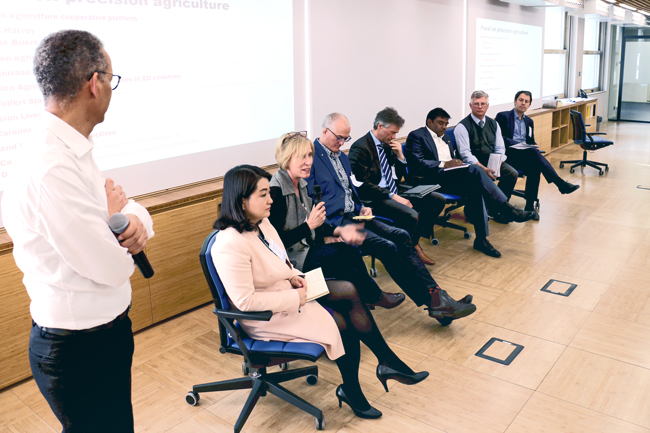The ‘fourth industrial revolution’, FAO hosts informal exchange on digital technologies

The surge in digital technologies – called the ‘fourth industrial revolution’ – is changing the game in agriculture, making systems more productive, profitable and sustainable.
The challenge is to ensure that revolution works for everyone, especially small-scale farmers.
FAO’s Investment Centre and Information Technology Divisions recently hosted an informal knowledge exchange on digital agriculture.
They welcomed participants from the public and private sector, including partners from the World Bank and the European Bank for Reconstruction and Development (EBRD).
In his opening remarks, FAO Investment Centre Director Mohamed Manssouri said it was an “opportunity for us, as the public sector, to listen and learn about this changing reality driven by the private sector, so we are better equipped to propose innovative investment solutions for food and agriculture.”
Simeon Ehui, Director of the World Bank’s Agriculture Global Practice, noted that the single most urgent challenge facing global food supplies was “how to ensure the sustainable production of diverse foods to nourish the world without destroying our ability to do so.”
Agriculture lags behind other sectors in adopting digital technologies. Understanding how to promote uptake among farmers, deliver solutions at scale and better prepare agricultural universities and training institutes is key, he added.

Precision agriculture
Diverse technologies, from smartphones to the Internet of Things (IoT) and artificial intelligence (AI), enable farmers to make better decisions to optimize farm productivity and minimize risk.
Ros Harvey, CEO of The Yield, an Australian agricultural technology company, said they were “taking the guesswork out of growing” by providing farmers with an integrated set of AgTech solutions that combine hardware, data analytics and user-friendly apps.
“We’re taking local environmental parameters, for example, and using artificial intelligence to make highly localised predictions and converting these into easy to use apps that help growers to know when to plant, feed, irrigate, protect and harvest their crops,” she said.
“Farmers operate on small margins, so we have a big responsibility to create real value for them and not put them at risk. Farmers need to be at the centre of the ecosystem,” she added.
Mike Briers is CEO of Food Agility Cooperative Research Centre, a USD 150 million innovation hub leading a digital revolution in food production and supply in Australia. The Yield is one of Food Agility’s strategic partners.
Food Agility brings together diverse stakeholders – farmers, government, tech providers and researchers – to build digital tools that respond to local challenges. They also promote an important dimension of digital transformation: how to establish a conducive ecosystem that allows synergy and capacity building to tackle the supply side constraints of digital agriculture.
Other panellists included Srinivasu Pappula, Global Head of Digital Farming Initiatives from Tata Consultancy Services. Their precision agriculture platform is empowering around one million small farmers in India, creating climate- and market-smart villages.
In China, GOKE is a high-tech enterprise providing solutions to improve livestock farming on 5,000 farms, said its CEO Caroline Li. Small farmers can access its farm management cloud platform (16 livestock platforms are already in operation) to improve efficiency – from information on herd management and nutrition to cooling systems.
Also participating on the panel was Sjaak Wolfert from Wageningen University & Research who gave an overview of initiatives on digital agriculture in Europe. He stressed the importance of a multidisciplinary, collaborative and agile approach for agrifood’s digital transformation.
The EU-funded project SmartAgriHubs is setting up a network of Digital Innovation Hubs in agriculture across the continent to conduct innovation experiments and encourage greater uptake among farmers – an approach that could be used in other parts of the world.

Disruptive technologies
According to Dan Jones, CEO of BEXT 360, while the average company only knows roughly 7 percent about their global supply chain, sustainable finance and consumer demand will necessitate supply chain transparency.
BEXT 360 uses blockchain to track global commodities, like coffee and cotton, and tokenize assets to facilitate capital access for producers.
IBM, on the other hand, is using “weather and AI analytics innovations to aid decision-making from farm to fork,” said Dan Wolfson, Director and Chief Technology Officer for Data and Analytics at IBM Watson Media and Weather.
Greater accuracy, frequency and updating are among the advantages of its global hi-resolution forecasting.
“Our three-day forecast is as accurate as our one-day forecasts were in 2010, and we are getting faster at correcting ourselves and providing a better outcome,” Wolfson said.
Another panellist Connie Bowen, Executive Director of The Yield Lab Institute, said that while AgTech investment was peaking, challenges like limited connectivity among stakeholder groups were a constraint.
The Yield Lab invests in and accelerates high-impact early stage companies through its regional accelerator programmes and growth fund. It also seeks to connect and educate stakeholders globally through its Institute.
Leave no one behind
Given that FAO will have to mainstream digital technologies into its core activities, it needs to be able to advise governments effectively.
FAO is well placed to serve as a bridge between the public and private sectors in this area. It is now working with the World Bank and the EBRD to ensure digital agriculture promotes equity and environmental sustainability.
Capacity building among farmers is also key to avoid deepening the digital divide, said Wafaa El Khoury, Chief of the Investment Centre’s Europe, Central Asia, Near East, North Africa, Latin America and the Caribbean service.
“The digital transformation in agriculture is exciting and fast-moving. We should ensure that the digital technologies build on and enhance the precious indigenous knowledge of farmers rather than replace it. As custodians of the public good, we need to make sure the people we serve – small-scale farmers, women, rural youth – are able to harness the benefits of these technologies and not be left behind.”
Photocredits: UNDP; FAO/JordiVaqueRabal;
